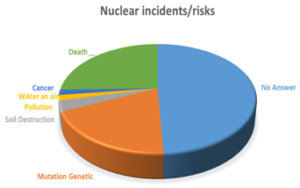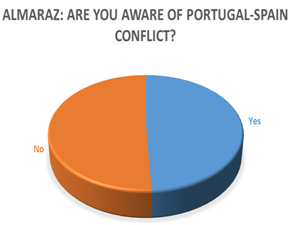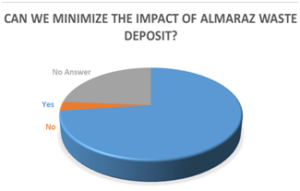One of the problems with the use of nuclear energy – in addition to the risks inherent to the operation of nuclear power plants, with a number of reported incidents – is the management of the produced wastes, whose action can last between 30 and 300years – , and, namely, its storage ( Zero, 2017, Quercus, 2017).
On 6 January 2017, Portugal considers that, regarding the construction of the nuclear waste facility, Spain did not follow the Directive No 259 of the E.U. Treaty , since no cross-border environmental impact studies have been carried out. A month later the complaint is withdrawn (postponed?) – a “amicable settlement” sponsored by the European Commission.
Are the Portuguese aware of the risks of nuclear energy?
Do the Portuguese agree on “Amicable settlement” concerning Almaraz?
Young Reporters for the Environment (YRE) from Caneças secondary school sought answers to these questions from the Ministry of the Environment, Nongovernmental Organizations (NGOs) and the common citizen. Up to the closing date of the edition of our newspaper there was no governmental reply.
NGOs – QUERCUS & ZERO
YRE: 1st What is the official opinion on the construction of Almaraz nuclear waste warehouse?
ZERO: the construction is only an excuse to extend the closure date of the plant since it has pools with storage capacity until 2020, date foreseen for the closure of the plant (it is not necessary to build the planned waste facility).
QUERCUS: It is not necessary from the technical point of view: the plant has the capacity to store the waste it produces up to the end of 2020. It’s just an excuse to extend the plant life. Actually, the study of the Environmental Impact Study of Nuclear waste facility itself points out that the Plant can function by 2020, without the construction of the warehouse.
YRE: 2nd which are the consequences/risks of the waste facility?
ZERO: The consequences and the risks to the environment and to Portugal are enormous. There are no emergency plans with cross-border environmental impact studies, the seismic risk has not been properly assessed.
The construction of the warehouse will also have a negative impact on birds with the destruction of their habitats.
Furthermore occurring an accident in the Valdecañas dam, a flood may take place, which will quickly reach the Almaraz plant and, consequently, the resulting radioactivity will lead to the destruction of the fields and the pollution of the waters of the Tagus river. Building this waste facility may endanger public health and its safety.
QUERCUS: The main consequence is the extension of the operation of the Nuclear Plant, with increasing safety problems.
As for the warehouse itself: the transportation of radioactive material from the Plant pools to the projected waste facility, involve risks of contamination of the river – the facility will be located next to the Arrocampo , in the Tagus river.
Furthermore the seismic risk was not properly assessed, and the limit values for radioactivity in the area can reach 3 microSv / h, which is higher than the values allowed for the general public.
An upstream problem in the Valdecañas dam (rupture or destruction of the dam), the deposit and the Plant would be flooded (very low probability but very high damages, because the radioactivity is lethal in a very short time, with soil contamination and water, preventing farming to cultivate and food production.
There are also Bird Protection Areas and three habitats of high environmental value, which can be highly affected by the movement of vehicles with materials for the construction as well as noise caused by the construction process
3rd Which alternatives can be suggested to replace this Waste Deposit? Measures to minimize its impact?
ZERO & QUERCUS : The main measure will be the non-construction of the Waste Facility and the closure of the Almaraz Plant in 2020.The alternative is to focus on greater energy efficiency (lower consumption ) and on renewables.
ZERO: Nowadays, renewable energies, such as solar and wind, have had many technological advances, can even compete economically with nuclear energy. Nuclear energy is no longer a cheap energy, and has unbearable risks (e.g.,Chernobyl and Fukushima, as well as Three Mile Island, in 1979)
I point out that last year Portugal achieved 107 hours of electricity production from renewable energy alone.
When it comes to radioactive waste, the concepts of temporary and definitive are very relative. These highly radioactive wastes remain dangerous for thousands of years – plutonium takes 24,000 years to reduce its radioactivity by half.
A Temporary Deposit, on a scale of radioactive waste, has an expected duration of 60 to 100 years. It is not so temporary. Regarding definitive Waste Facility, there is none in the world, despite studies and pre-projects in Sweden, Finland and the United States.
5th Do you agree with the position of the Portuguese government in withdrawing / postponing the complaint to the EU?
ZERO: We were very hesitant about postponing the complaint to the EU. However, by consulting the documents made available on the Government Portal, we realize there is nothing new about crossborder impacts. And nothing is said about the consequences of this public consultation. What happens if the reaction of the Portuguese population is overwhelmingly against the construction. What will the Spanish State do? And since there is no study on cross-border impacts, Portugal has all the legitimacy, and must do so!, to apply the complaint back to the EU.
QUERCUS: Redrawing the complaint was a weak position taken by the Portuguese government. The public consultation that is being held has no validity. This agreement is a way for Brussels and Spain to impose their position.
AND THE COMMON CITIZEN?
The results of 63 street surveys show, on the one hand, lack of information/Knowledge about the conflict and, on the other hand, a certain helplessness regarding the impact of the construction of the Waste Deposit.
One aspect seem to match most of the answers:
The Portuguese seem to find no reason to withdraw the U.E. complaint and fear the risks of nuclear near their border.





You must be logged in to post a comment.